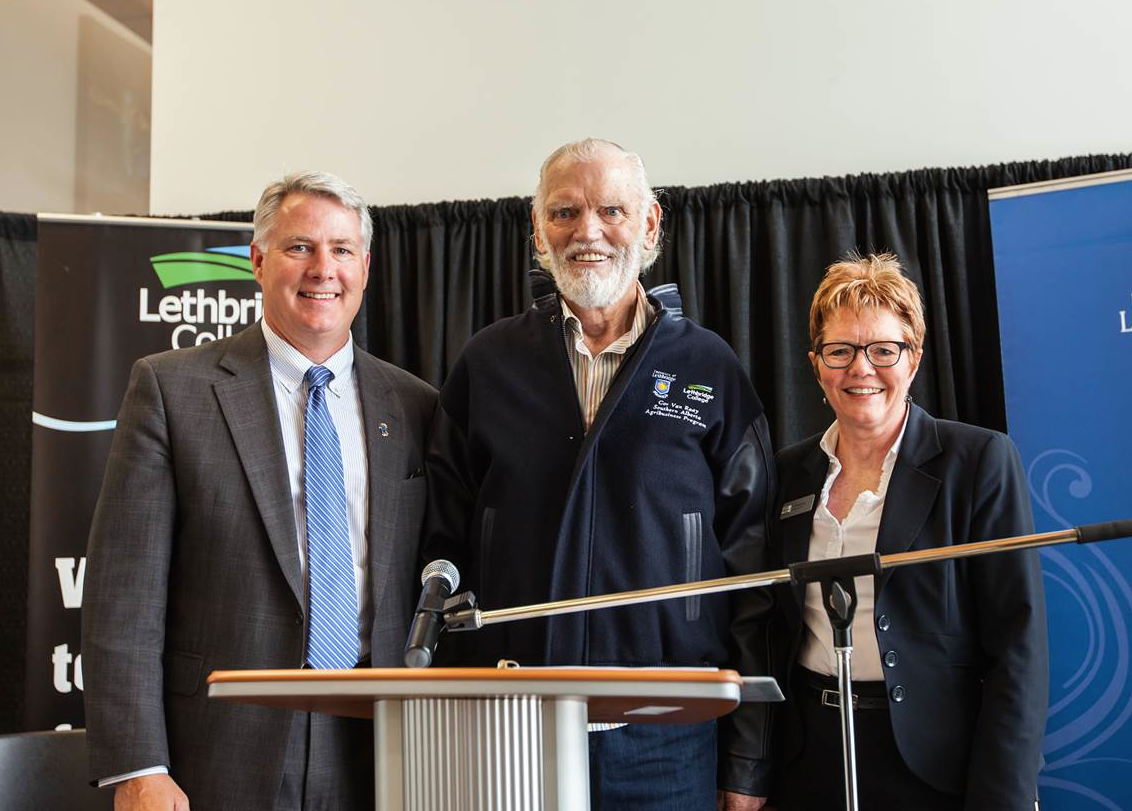From droughts and pests to crop disease and unseasonable snowstorms, farming in this semi-arid section of Alberta’s Big Sky Country comes with big challenges. But from the early First Nations peoples to the homesteaders of the 1900s to today’s technologically savvy crop and livestock producers, Albertans have a long history of ingenuity and resilience. And thanks to forward-thinking donors, University of Lethbridge researchers and trailblazing initiatives for agriculturalists-in-training, that strong tradition of inventiveness will continue in the future.

“As global food demand increases, the need for Alberta agriculture is becoming stronger than ever,” says Dr. Matthew Letts, the U of L’s interim associate vice-president (research). “To take advantage of this opportunity, there is a critical need for innovative agricultural research and data-driven agribusiness.”
These types of activity, he notes, are happening at – and are supported by – the U of L.
The University is located in the heart of southern Alberta, where farming and ranching are among the most important regional sources of jobs and wealth. Many faculty are experts in fields connected to agriculture, including biotechnology, remote sensing, economics and management.
In addition, the University is a leading-edge learning environment for aspiring agriculturalists. An increasing number of graduate students are in agriculture-related disciplines while the Agricultural Studies program enables undergraduates to learn about the physical and economic interrelationships between agricultural production, marketing, trade and nutrient management, water, grazing and rangeland and riparian management.
Indeed, the University’s reputation for excellence in agricultural research and education is what led Cor Van Raay, a leading Canadian cattle producer, to make a major gift to the University. Last June, the founder of Cor Van Raay Farms donated a total of $5 million to the University of Lethbridge and Lethbridge College to
establish the Cor Van Raay Southern Alberta Agribusiness Program.
Through this initiative, a joint program offered by the University and the College will be created, focusing on agriculture-related educational opportunities in economics, business development, entrepreneurship, finance, management, commodities trading and leadership, all with an emphasis on agricultural innovation. Van Raay’s donation will support endowed student awards, enhanced academic programming, an innovation and entrepreneurship program (at the U of L) and an agriculture entrepreneur-in-residence (at LC).
These initiatives will be complemented by the University’s new Research Chair in Potato Science. This position, announced in July, will be supported by a $1-million investment over five years from the Potato Growers of Alberta, McCain Foods, ConAgra Foods Lamb Weston and Cavendish Farms.
The Chair in potato science will expand research in the province’s potato industry, which is worth more than $1 billion annually. It is anticipated that the chairholder will collaborate with producers and industry partners, create additional learning opportunities for graduate and undergraduate students and help develop new potato varieties.
Together, the Cor Van Raay Southern Alberta Agribusiness Program and the Research Chair in Potato Science are expected to stimulate agricultural research and agribusiness at the U of L’s new Centre for Agricultural Research and Agribusiness Innovation (CARAI). Centre researchers will study pest and disease mechanisms, develop surveillance and detection mechanisms, and explore the use of remote sensing to produce data-driven agriculture.
The CARAI will prepare the agribusiness leaders of the future. Students will have access to fellowships and co-op placements, and will benefit from industrial research partnerships with producers and processors. In the end, graduates will be primed to develop solutions that will meet the demands of a growing global population.
“Collectively,” concludes Letts, “all of these initiatives will strengthen our position as a leader in agricultural education and research.”

